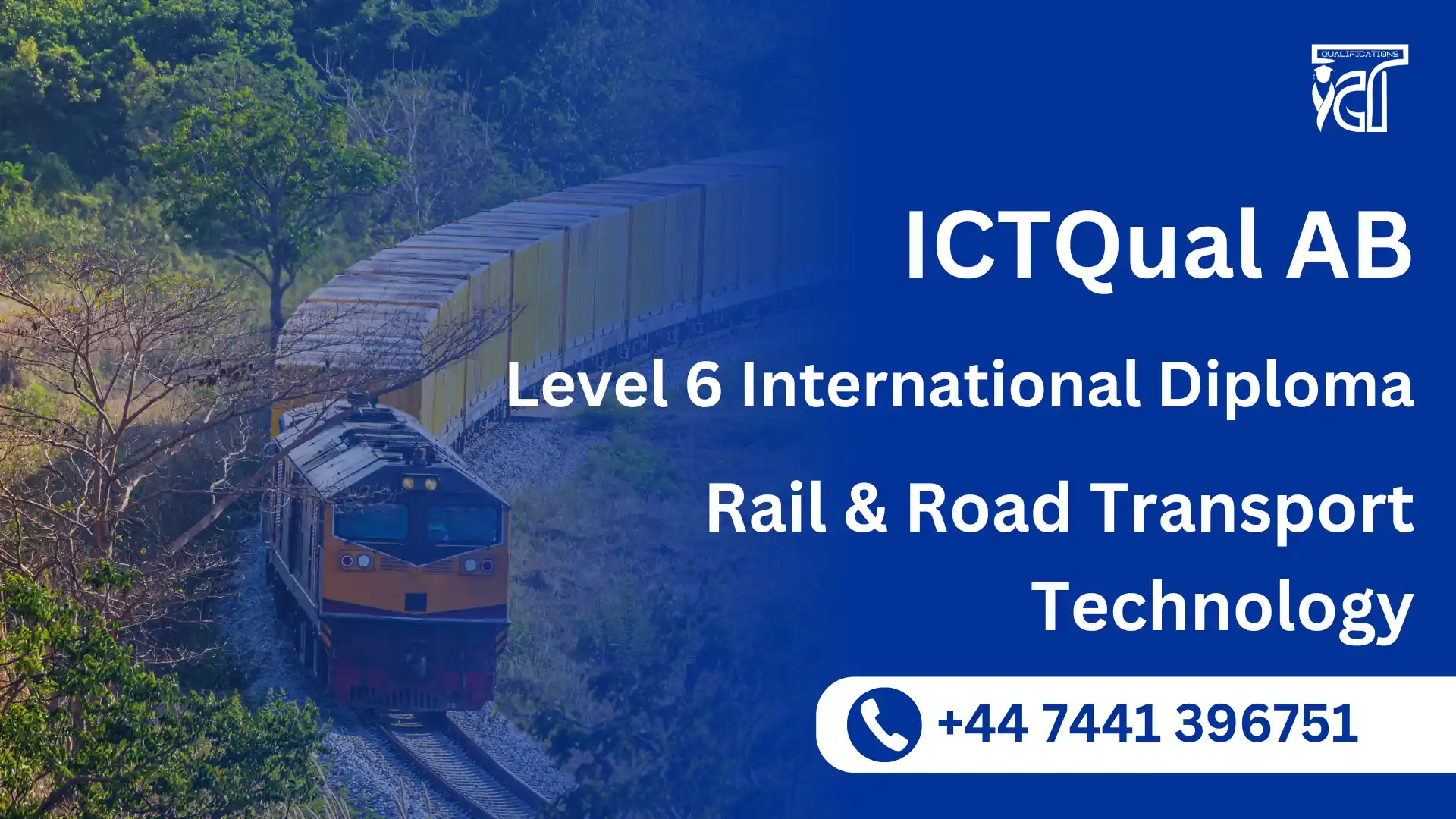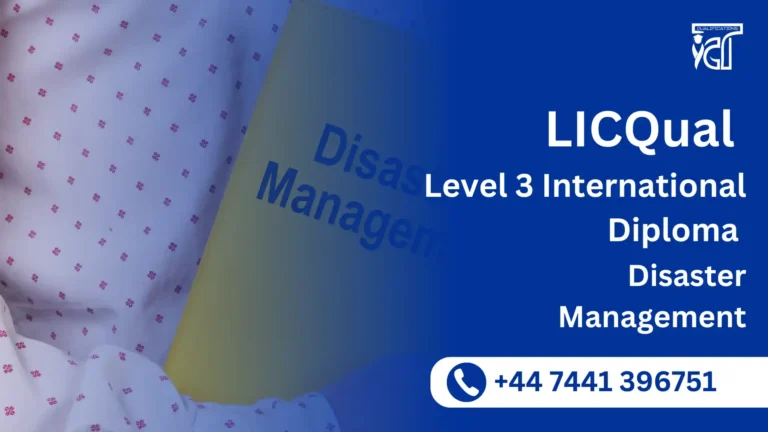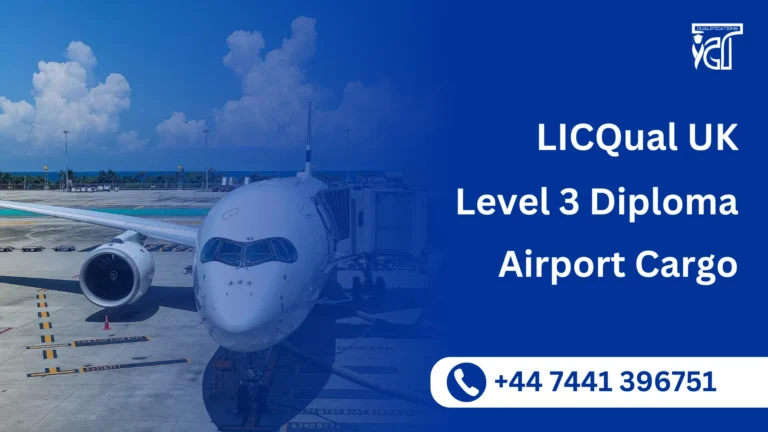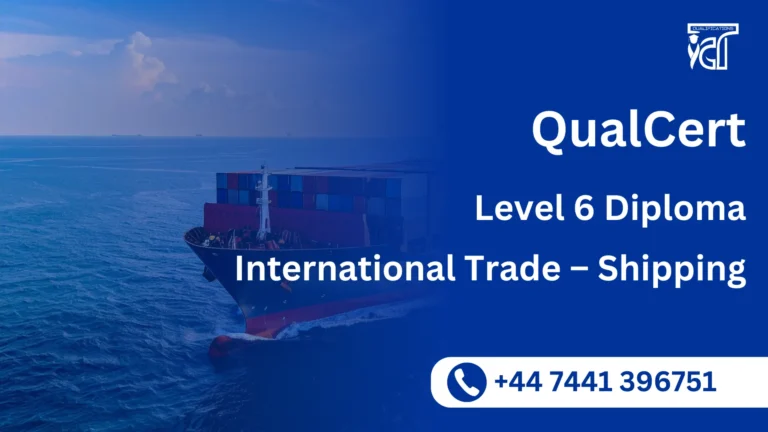The ICTQual AB Level 6 International Diploma in Rail & Road Transport Technology is a comprehensive programme designed for learners aiming to excel in the rapidly evolving transport and logistics sector. Whether you are a fresher seeking to launch a career in rail or road transport or an experienced professional looking to advance into leadership and technical management roles, the ICTQual AB Level 6 International Diploma in Rail & Road Transport Technology equips learners with the knowledge, practical skills, and strategic insight required to thrive in modern transport technology operations.
Spanning three years and structured around a 360-credit framework, the programme provides in-depth coverage of rail systems, road transport technologies, logistics management, transportation planning, and safety compliance. Learners gain the expertise to design, implement, and manage efficient transport solutions while understanding emerging trends in intelligent transport systems, automation, and sustainable mobility.
Graduates of the ICTQual AB Level 6 International Diploma in Rail & Road Transport Technology emerge with a strong professional profile, ready to pursue careers in transport planning, fleet management, logistics coordination, infrastructure management, and operational leadership. The programme emphasises both technical competency and strategic decision-making, enabling learners to address complex challenges in rail and road transport sectors globally.
Key benefits of completing the ICTQual AB Level 6 International Diploma in Rail & Road Transport Technology include enhanced career prospects, specialised knowledge in rail and road transport technologies, and the ability to lead operational and strategic projects. Learners develop critical problem-solving, analytical, and project management skills, positioning themselves as competent, adaptable, and industry-ready professionals.
By combining theoretical foundations with practical applications, the ICTQual AB Level 6 International Diploma in Rail & Road Transport Technology provides learners with a holistic, career-oriented education, supporting long-term professional growth and international recognition in the transport and logistics industry.
ICTQual AB Level 6 International Diploma in Rail & Road Transport Technology
This qualification, the ICTQual AB Level 6 International Diploma in Rail & Road Transport Technology, consists of 36 mandatory units.
Year 1 – Foundations of Rail & Road Transport Technology
- Introduction to Rail & Road Transport Industry
- Principles of Transport Operations
- Transport Engineering Fundamentals
- Traffic Management and Control Systems
- Transport Law and Regulatory Frameworks
- Infrastructure Planning and Maintenance Basics
- Safety and Security in Rail & Road Transport
- Environmental Sustainability in Transport
- Logistics and Supply Chain Management
- Principles of Risk Management in Transport Operations
- Transport Economics and Policy
- Professional Ethics and Communication in Transport
Year 2 – Applied Transport Operations & Management
- Advanced Rail and Road Operations Planning
- Freight and Passenger Transport Management
- Transport Logistics Integration and Optimisation
- Infrastructure Project Management
- Safety Compliance and Risk Mitigation in Transport
- Crisis Management and Emergency Response
- Transport Finance, Budgeting, and Cost Control
- Environmental Compliance and Emissions Management
- Digitalisation and Smart Transport Technologies
- Human Resource Management in Transport Organisations
- Applied Case Studies in Transport Operations
- Operational Simulations and Practical Exercises
Year 3 – Strategic Leadership & Advanced Transport Management
- Strategic Management in Rail & Road Transport
- Transport Policy, Governance, and International Standards
- Legal Contracts and Regulatory Compliance in Transport
- Leadership and Decision-Making in Transport Operations
- Advanced Risk and Safety Management
- Infrastructure Planning and Strategic Development
- Global Supply Chain Management for Transport
- Emerging Technologies and Innovation in Transport
- Sustainability and Climate Change Adaptation in Transport
- Research Methods for Transport Technology
- Independent Research Project in Rail & Road Transport
- Capstone Project: Applied Strategic Transport Management
Learning Outcomes for the ICTQual AB Level 6 International Diploma in Rail & Road Transport Technology 360 Credits – Three Years:
Year 1 – Foundations of Rail & Road Transport Technology
1. Introduction to Rail & Road Transport Industry
- Explain the structure, scope, and key stakeholders in the global rail and road transport sector.
- Analyse trends and developments shaping modern transport systems.
2. Principles of Transport Operations
- Describe core operational processes in rail and road transport.
- Apply operational principles to ensure efficient and safe transport management.
3. Transport Engineering Fundamentals
- Understand engineering concepts related to rail tracks, road networks, and transport vehicles.
- Apply basic engineering principles to support infrastructure and operational planning.
4. Traffic Management and Control Systems
- Analyse traffic flow and congestion management strategies.
- Apply control systems to optimise transport operations and safety.
5. Transport Law and Regulatory Frameworks
- Explain key national and international laws governing rail and road transport.
- Ensure compliance with regulatory requirements in operational planning.
6. Infrastructure Planning and Maintenance Basics
- Describe methods for planning, constructing, and maintaining transport infrastructure.
- Apply maintenance principles to ensure safety and operational efficiency.
7. Safety and Security in Rail & Road Transport
- Identify risks and hazards in transport operations.
- Implement standard safety and security protocols to mitigate operational risks.
8. Environmental Sustainability in Transport
- Analyse the environmental impact of transport operations.
- Develop strategies to reduce emissions and promote sustainable practices.
9. Logistics and Supply Chain Management
- Understand basic supply chain processes in transport systems.
- Apply logistics principles to improve operational efficiency.
10. Principles of Risk Management in Transport Operations
- Identify operational and strategic risks in rail and road transport.
- Apply basic risk assessment and mitigation strategies.
11. Transport Economics and Policy
- Analyse economic factors affecting transport systems.
- Apply economic principles to operational and strategic decision-making.
12. Professional Ethics and Communication in Transport
- Apply ethical principles in transport management and operations.
- Develop effective communication strategies for organisational and operational contexts.
Year 2 – Applied Transport Operations & Management
1. Advanced Rail and Road Operations Planning
- Develop comprehensive operational plans for transport systems.
- Optimise scheduling, routing, and resource allocation.
2. Freight and Passenger Transport Management
- Plan and manage freight and passenger transport operations efficiently.
- Apply regulatory and safety standards in operational decision-making.
3. Transport Logistics Integration and Optimisation
- Integrate logistics processes within rail and road transport systems.
- Apply optimisation techniques to improve efficiency and reduce costs.
4. Infrastructure Project Management
- Plan, implement, and monitor transport infrastructure projects.
- Ensure projects meet quality, safety, and budgetary requirements.
5. Safety Compliance and Risk Mitigation in Transport
- Develop and implement safety compliance strategies.
- Apply advanced risk management techniques to mitigate operational hazards.
6. Crisis Management and Emergency Response
- Develop emergency response plans for transport incidents.
- Coordinate operations during crises to minimise disruption.
7. Transport Finance, Budgeting, and Cost Control
- Prepare financial plans for transport operations.
- Analyse budgets, costs, and revenue streams to ensure financial efficiency.
8. Environmental Compliance and Emissions Management
- Ensure compliance with environmental regulations.
- Implement emission reduction and sustainable transport initiatives.
9. Digitalisation and Smart Transport Technologies
- Evaluate emerging digital technologies in transport systems.
- Apply smart transport solutions to enhance operational efficiency.
10. Human Resource Management in Transport Organisations
- Apply HR management principles within transport organisations.
- Develop strategies for team leadership, performance management, and workforce development.
11. Applied Case Studies in Transport Operations
- Analyse real-world transport scenarios to solve operational challenges.
- Apply theoretical knowledge to practical problem-solving in transport management.
12. Operational Simulations and Practical Exercises
- Participate in simulations to replicate real transport operations.
- Apply planning, management, and safety skills in controlled practical environments.
Year 3 – Strategic Leadership & Advanced Transport Management
1. Strategic Management in Rail & Road Transport
- Develop and implement strategic plans for transport organisations.
- Analyse industry trends and competitive factors to inform strategic decisions.
2. Transport Policy, Governance, and International Standards
- Evaluate international transport policies, governance, and standards.
- Apply compliance requirements to organisational strategies and operations.
3. Legal Contracts and Regulatory Compliance in Transport
- Interpret transport contracts, agreements, and regulatory obligations.
- Ensure legal and regulatory compliance in operational and strategic decisions.
4. Leadership and Decision-Making in Transport Operations
- Apply leadership theories to manage transport teams and operations effectively.
- Make strategic decisions in complex operational environments.
5. Advanced Risk and Safety Management
- Develop comprehensive risk management strategies for transport operations.
- Implement proactive safety measures to protect personnel, assets, and infrastructure.
6. Infrastructure Planning and Strategic Development
- Plan and manage large-scale transport infrastructure projects.
- Apply strategic thinking to long-term network and facility development.
7. Global Supply Chain Management for Transport
- Manage integrated supply chains across international rail and road networks.
- Analyse logistics performance and propose improvements for global operations.
8. Emerging Technologies and Innovation in Transport
- Evaluate innovative technologies transforming transport systems.
- Implement technology-driven solutions to improve efficiency and competitiveness.
9. Sustainability and Climate Change Adaptation in Transport
- Analyse climate change impacts on transport infrastructure and operations.
- Develop strategies to enhance sustainability and resilience in transport systems.
10. Research Methods for Transport Technology
- Apply research methodologies to transport studies.
- Collect, analyse, and interpret data to support evidence-based decisions.
11. Independent Research Project in Rail & Road Transport
- Conduct independent research addressing industry challenges.
- Present findings with practical recommendations for transport operations.
12. Capstone Project: Applied Strategic Transport Management
- Integrate knowledge and skills from all study units into a comprehensive project.
- Demonstrate strategic planning, operational execution, and leadership in transport scenarios.
Completing the ICTQual AB Level 6 International Diploma in Rail & Road Transport Technology equips learners with the technical expertise, practical skills, and professional credibility to excel in the transport and logistics sector. This programme prepares learners to manage operations efficiently, implement transport technologies, and lead projects in rail and road systems globally.
1. Advanced Knowledge in Transport Technology
- In-depth understanding of rail and road transport systems, including infrastructure, vehicles, and operational management.
- Knowledge of transport planning, scheduling, and route optimisation.
- Insight into intelligent transport systems, automation, and emerging mobility trends.
- Awareness of safety standards, regulatory compliance, and environmental considerations.
- Ability to analyse and improve transport efficiency and service quality.
2. Career Advancement Opportunities
- Eligibility for managerial and supervisory roles in rail and road transport organisations.
- Opportunities in logistics management, fleet operations, and transport infrastructure planning.
- Roles in consultancy, transport project management, and operational coordination.
- Positions in government transport authorities, private transport companies, and international logistics firms.
- Strong foundation for strategic and leadership roles in the transport sector.
3. Practical Skills Development
- Competence in fleet management, operational planning, and transport coordination.
- Training in safety management, risk assessment, and compliance procedures.
- Development of problem-solving, analytical, and decision-making skills.
- Hands-on experience with transport scheduling, traffic management, and operational software tools.
- Ability to design, implement, and evaluate transport solutions effectively.
4. Professional Recognition and Credibility
- Demonstrates commitment to professional excellence in transport technology and logistics management.
- Strengthens credibility for roles in corporate, public sector, and international transport organisations.
- Provides a verifiable, internationally recognised qualification.
- Prepares learners for leadership and advisory roles within the industry.
- Enhances professional reputation and global employability.
5. Long-term Industry and Societal Impact
- Empowers learners to contribute to safe, efficient, and sustainable transport systems.
- Encourages adoption of innovative and environmentally responsible transport solutions.
- Builds confidence in leading teams and projects in complex transport operations.
- Supports the development of transport policies and operational best practices.
- Prepares learners to address global transport challenges effectively.
The ICTQual AB Level 6 International Diploma in Rail & Road Transport Technology is designed for learners passionate about transport systems, logistics management, and technological innovations in rail and road transport. It is suitable for both fresh learners and experienced professionals seeking advanced knowledge and career progression.
1. Aspiring Transport Professionals
- Fresh learners aiming to start a career in rail or road transport, logistics, or fleet management.
- Individuals interested in transport planning, traffic management, and operational systems.
- Learners seeking structured education in transport technology and infrastructure management.
- Those motivated to contribute to safe and efficient transport operations.
- Learners eager to combine theory with practical skills for immediate industry application.
2. Experienced Professionals Seeking Growth
- Professionals in transport, logistics, or related sectors looking to specialise in rail and road technologies.
- Individuals aiming for leadership, project management, or strategic roles.
- Managers seeking expertise in scheduling, fleet optimisation, and operational efficiency.
- Consultants providing advisory services in transport and logistics.
- Professionals seeking international recognition and career mobility.
3. Learners Interested in Policy and Governance
- Individuals keen to understand transport regulations, compliance, and operational governance.
- Those aiming to influence strategic decisions in transport planning and infrastructure management.
- Learners seeking to lead projects in government or private transport authorities.
- Professionals interested in sustainable and ethical transport practices.
- Learners motivated to implement innovative solutions in the transport sector.
4. Analytical and Technical Thinkers
- Learners capable of assessing data, traffic patterns, and operational performance.
- Individuals comfortable using software and digital tools for transport management.
- Critical thinkers able to solve complex operational challenges.
- Those interested in integrating technology, efficiency, and sustainability in transport projects.
- Learners who value precision, efficiency, and strategic planning.
5. Globally Minded and Industry-Focused Learners
- Individuals committed to international best practices in rail and road transport.
- Learners aiming to work in multinational transport organisations or logistics companies.
- Those motivated to implement innovative solutions in complex transport environments.
- Professionals seeking to develop leadership skills for global transport projects.
- Learners focused on creating safe, efficient, and sustainable transport systems.
Graduates gain access to diverse career paths and professional development opportunities in the transport and logistics sector.
1. Career Advancement in Transport
- Managerial roles in rail companies, road transport organisations, and logistics firms.
- Strategic positions in fleet operations, scheduling, and infrastructure management.
- Roles in consultancy, operational coordination, and transport project management.
- Leadership roles in public transport authorities or private sector transport operations.
- Opportunities to influence organisational policies and efficiency standards.
2. Specialised Professional Opportunities
- Transport operations manager, fleet coordinator, logistics analyst, or project lead.
- Engagement in international transport projects, safety compliance, and scheduling optimisation.
- Participation in research and development of transport technology solutions.
- Roles in sustainable transport, traffic management, and mobility innovation.
- Opportunities to implement intelligent transport systems and advanced logistics solutions.
3. Leadership and Strategic Roles
- Leading teams in transport operations and logistics management projects.
- Overseeing strategic planning and implementation of rail and road transport initiatives.
- Managing large-scale projects, fleet operations, and transport networks.
- Becoming a recognised professional in international transport networks.
- Influencing policy, compliance, and operational strategy in the sector.
4. Academic and Professional Development
- Further studies in transport management, logistics, or infrastructure planning.
- Professional certifications in transport technology, fleet management, or safety.
- Participation in international workshops, seminars, and research collaborations.
- Opportunities to teach or consult in transport management programmes.
- Enhanced employability and global career mobility.
5. Industry and Societal Impact
- Contribute to safe, efficient, and sustainable rail and road transport systems.
- Lead initiatives improving operational efficiency and reducing environmental impact.
- Engage with international teams on transport projects and innovations.
- Launch consultancy services or implement technology-driven transport solutions.
- Make meaningful contributions to global mobility and transport development.
As an approved ICTQual AB centre, we offer two certification pathways tailored to meet the needs of learners with varying levels of experience in rail and road transport technology. All learners must enrol with our centre to access study materials, guidance, and assessment support.
Route 1: Experienced Professionals
This route is designed for learners who have at least six years of verifiable experience in rail, road, or logistics operations. It recognises prior expertise and focuses on advanced learning to prepare professionals for leadership and specialised roles.
Key Features:
- Concentrates on advanced modules covering strategic management, operational efficiency, and transport technology innovations.
- Includes applied projects and real-world case studies to develop practical problem-solving skills.
- Equips learners for leadership, consultancy, and specialist roles in transport and logistics organisations.
- Accelerates career growth by leveraging prior experience alongside international recognition.
Route 2: Fresh Learners
This route is for learners who are new to transport technology or logistics management. It provides a structured pathway to develop foundational knowledge and practical skills necessary for a successful career.
Key Features:
- Learners are required to complete 36 structured assignments, covering all core aspects of rail and road transport technology.
- Builds a solid foundation in operational planning, fleet management, logistics, and safety compliance.
- Prepares learners for entry-level roles and supports long-term career progression.
- Develops essential practical and analytical skills for managing real-world transport operations.
Entry Requirements
1. Minimum Age
- Learners must be at least 18 years old at the time of enrolment.
2. Educational Background
- Route 1 (Experienced Professionals): Level 5 qualification is advantageous but not mandatory.
- Route 2 (Fresh Learners): Level 3 qualification (e.g., A-levels or equivalent) is typically required.
3. Experience
- Route 1: Minimum of 6 years verifiable experience in rail, road, or logistics operations.
- Route 2: No prior experience required; learners must complete 36 structured assignments to build foundational knowledge.
4. Language Proficiency
- Proficiency in English is essential for understanding course materials, participating in discussions, and completing assignments successfully.
Register Now
Qualification Process
Qualification Process for the ICTQual AB Level 6 International Diploma in Rail & Road Transport Technology
- Self-Assessment:
Begin by evaluating your eligibility to ensure you meet the qualification requirements, including work experience, knowledge, and language proficiency. - Registration:
Complete your registration by submitting the required documents, including a scanned copy of a valid ID, and paying the registration fee. - Induction:
An assessor will conduct an induction to confirm your eligibility for the course and explain the evidence requirements. If you do not meet the criteria, your registration will be cancelled, and the fee will be refunded. - Assignments & Evidence Submission:
Provide all assignments and the necessary evidence based on the assessment criteria outlined in the course. If you are unsure of the required evidence, consult with the assessor for guidance on the type and nature of evidence needed. - Feedback and Revision:
The assessor will review your submitted evidence and provide feedback. Evidence that meets the criteria will be marked as “Criteria Met,” while any gaps will be identified. You will be asked to revise and resubmit if needed. - Competence Evidence:
Submit final evidence demonstrating that all learning outcomes have been met. This evidence will be marked as “Criteria Met” by the assessor once it is satisfactory. - Internal Quality Assurance (IQA):
The Internal Quality Assurance Verifier (IQA) will review your evidence to ensure consistency, quality, and compliance with standards. - External Verification:
The IQA will submit your portfolio to ICTQUAL AB External Quality Assurance Verifiers (EQA) for final confirmation. The EQA may contact you directly to verify the authenticity of your evidence. - Certification:
Upon successful completion of all checks, ICTQUAL AB will issue your official certificate, confirming that you have attained the ICTQual AB Level 6 International Diploma in Rail & Road Transport Technology.







